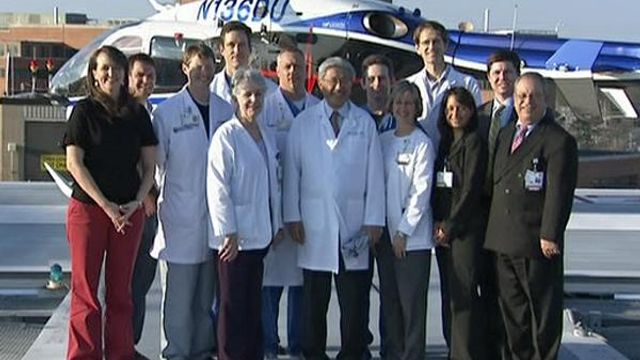Duke medical team to help people in Haiti
A Duke team of medical professionals will travel to Haiti on Friday to provide medical support to the earthquake-devastated country.
Posted — UpdatedYour browser doesn't support HTML5 video.
Your browser doesn't support HTML5 video.
In the three weeks since a catastrophic earthquake hit Haiti, the death toll has swelled to 200,000. Countless others are still in need of medical attention.
"We saw lots of crush wounds,” Nurse Clinician April Perry said. "We saw many, many amputations.”
Perry recently returned from Haiti. She spoke to the Duke team during a briefing Wednesday.
"We are preparing them for a bit of a marathon," Dr. Ian Greenwald said.
The team, consisting of 14 people, will conduct surgical procedures and provide care for those suffering from injuries and infectious diseases. They will spend 10 to 14 days in Haiti, working at two Cange hospitals, about two hours outside of Port-au-Prince.
"So I do not know how to thank you. It is wonderful,” Dr. Victor Dzau, president and chief executive of the Duke University Health System, told the team Wednesday as they prepared for their trip.
The team will carry some medical supplies with them, but Dr. Richard McCann, a vascular surgeon, said in many cases, it will come down to old-fashioned medicine.
"You have to rely on the old physical examination and intuition,” McCann said.
McCann has been to Haiti twice, most recently for six months in 2008.
"The resources are in very short supply and it is something you have to learn to deal with,” McCann explained.
The situation in and around Port-au-Prince requires immediate action to save lives. Volunteers, like the Duke surgeons and nurses, must also consider their own health risks and plan accordingly.
“People need to make sure they're up to date on all their usual vaccines: mumps, measles, rubella, varicella, tetanus,” UNC Hospitals epidemiologist Dr. David Weber said.
Your browser doesn't support HTML5 video.
Weber said mosquitoes in the Caribbean nation offer more threats than in the United States.
“It's very important for people to take mosquito netting, take insect repellent. They have two very important mosquito-borne diseases, malaria and dengue,” Weber explained.
• Credits
Copyright 2024 by Capitol Broadcasting Company. All rights reserved. This material may not be published, broadcast, rewritten or redistributed.
